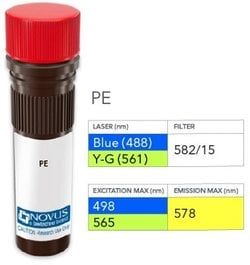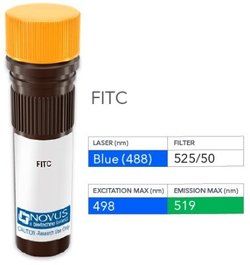Nucleolin Antibody (364-5) - IHC-Prediluted, Novus Biologicals™
Manufacturer: Novus Biologicals
Select a Size
| Pack Size | SKU | Availability | Price |
|---|---|---|---|
| Each of 1 | NBP248319-Each-of-1 | In Stock | ₹ 46,636.00 |
NBP248319 - Each of 1
In Stock
Quantity
1
Base Price: ₹ 46,636.00
GST (18%): ₹ 8,394.48
Total Price: ₹ 55,030.48
Antigen
Nucleolin
Classification
Monoclonal
Conjugate
Unconjugated
Formulation
10mM PBS and 0.05% BSA with 0.05% Sodium Azide
Gene Symbols
NCL
Immunogen
lysate of SU-DHL-1 Nuclei (Uniprot: P19338)
Purification Method
Protein A or G purified
Regulatory Status
RUO
Primary or Secondary
Primary
Test Specificity
Recognizes a protein of ∼76kDa, which is identified as Nucleolin (NCL). It is the major nucleolar phosphoprotein of growing eukaryotic cells. NCL is located mainly in dense fibrillar regions of the nucleolus. It is found associated with intranucleolar chromatin and pre-ribosomal particles. Human NCL gene consists of 14 exons with 13 introns and spans approximately 11kb. It induces chromatin decondensation by binding to histone H1. It is thought to play a role in pre-rRNA transcription and ribosome assembly. This monoclonal antibody can be used to stain the nucleoli in cell or tissue preparations and can be used as a marker of the nucleoli in subcellular fractions. It produces a speckled pattern in the nuclei of cells of normal and malignant cells and may be used to stain the nucleoli of cells in fixed or frozen tissue sections. It can be used with paraformaldehyde fixed frozen tissue or cell preparations and formalin fixed, paraffin-embedded tissue sections.
Content And Storage
Store at 4C.
Isotype
IgG1 κ
Applications
Immunohistochemistry (Paraffin)
Clone
364-5
Dilution
Immunohistochemistry-Paraffin
Gene Alias
C23, FLJ45706, FLJ59041, nucleolin, Protein C23
Host Species
Mouse
Molecular Weight of Antigen
76 kDa
Quantity
7 mL
Research Discipline
Cell Cycle and Replication, Chromatin Research, Core ESC Like Genes, DNA Repair, DNA replication Transcription Translation and Splicing, Stem Cell Markers
Gene ID (Entrez)
4691
Target Species
Human, Bovine (Negative), Mouse (Negative), Rat (Negative)
Form
Purified
Description
- Nucleolin Monoclonal specifically detects Nucleolin in Human, Bovine (Negative), Mouse (Negative), Rat (Negative) samples
- It is validated for Immunohistochemistry, Immunohistochemistry-Paraffin.



